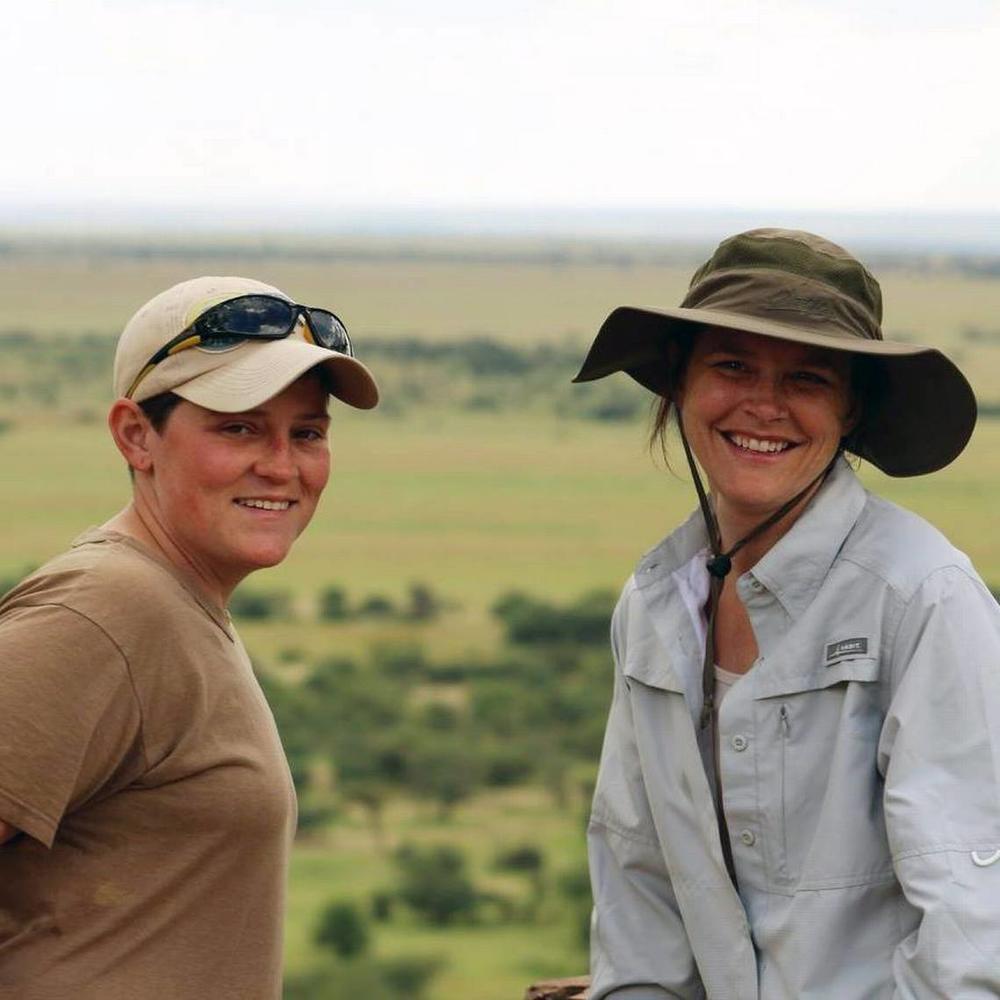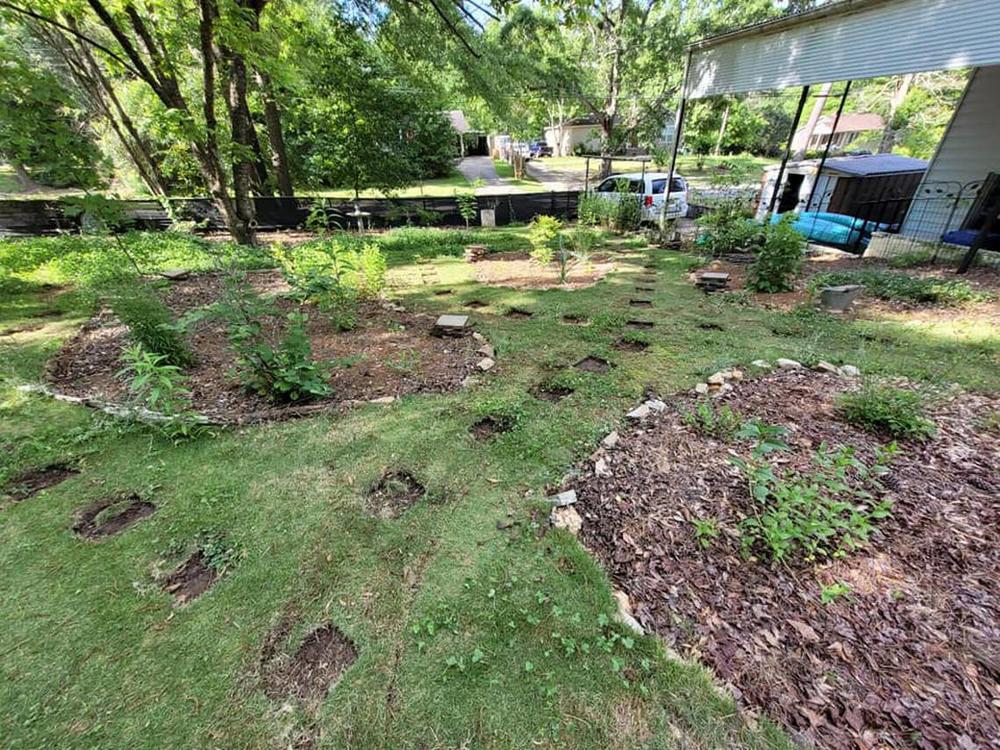
Caption
Ashely Desensi (left) and her wife Veronica Anderson are pictured on a trip in Tanzania in 2018.
Credit: Photo courtesy of Ashley Desensi
In the early '90s when Ashley Desensi was a child, she ran barefoot through the Columbus woods, caught snakes and lizards, climbed trees, read in tree forts, and played in her neighbors’ greenhouse on Armour Rd. She collected rocks from the Chattahoochee River and the surrounding creeks and painted them with her grandma. Together they would make salads with blueberries, persimmons, and plums.
A dark turn came when her mother’s alcohol abuse would tornado into meth and other hard drug use, accompanied by Ashley’s father.
“I had everything and lost it,” Desensi said. “I did tap, ballet, jazz. My mom was a PTA mom.”
Desensi’s love for nature runs deep and would eventually captivate her love for biology, science, animals, and plants. At 35, she is protecting Columbus’s water resources, advocating for native plant growth and invasive species removal, and finding joy through nurturing her three children.
The Chattahoochee River and the surrounding waterways are cleaner because of Desensi. She’s tracked and stopped sources of illegal pollution that break clean water laws. As a Columbus State University (CSU) biology professor she mentors a handful of graduate and undergraduate students. She serves as a committee member of the Columbus Botanical Garden Naturalist Symposium group and will serve as a board member for the Sierra Club Middle Chattahoochee chapter in 2024. And this year Desensi and her wife started their own native plant nursery nonprofit, Native Plant Coalition.

Ashely Desensi (left) and her wife Veronica Anderson are pictured on a trip in Tanzania in 2018.
At 10, she started raising her younger sister, Glennis Desensi because of how out-of-control her parents became. Within a few years, their maternal grandparents moved back to Columbus from Arizona to help raise them when things got “really bad.”
Her grandma and grandpa weren’t perfect, at times enabling her mom: partaking in a drink with her or giving her money that likely went to drugs. Desensi protected herself and her sister by locking them in the bedroom to avoid drunk harassment.
For years Ashley and Glennis suffered intense emotional and physical abuse. At 15, Ashley put her father in jail.
“He beat the daylight of me,” Desensi said. “I ran and called the police.”
Just last year Desensi got surgery and learned her father had deviated her septum 20 years ago.
“If not for Ashley during those first five years of development, I don’t know where I would be mentally or emotionally,” Glennis Desensi said. “I know that my memories of that time are dark aside from the memories of Ashley. She got us out. She got us into the care of our grandparents and did everything she could to help us get into a better place.”
Her mother “wormed” her way in and out of the Desensi sisters' life despite her grandparents getting custody. All the while, Ashley was still helping to raise Glennis. During these years their mother had another baby, whom Desensi helped raise with her grandparents, Emily Elizabeth.
At 16, she attempted an overdose and credits her grandpa for saving her. Around that same time, Ashely came out as gay to her family.
“They all told me God was going to kill me and I was going to burn in hell,” Ashley said.
She was expelled from high school her junior year for smoking a cigarette in the bathroom, following a series of what Desensi called “outlandish and wild” behavior.
After expulsion, Desensi started working at Muscogee County Humane Society (today Paws Humane). She worked her way up from a Kennel Tech, which Ashley calls a “glorified poop scooper,” to a Vet Tech conducting surgery and adoption intake.
She moved to work at Affordable Vet Services where she found healthy love and support that she lacked in her home life.
“This place was my second family,” Desensi said.
It was here where Ashley and Veronica Anderson, the program manager at Affordable Vet Services “fostered a deep friendship” that would eventually turn into a marriage.
She has an “unwavering commitment to animal well-being, genuine altruism, and compassion for others,” Anderson said.
Despite this, Desensi had not addressed the need to heal herself from her traumas. A recklessness toward herself caught the attention of her co-workers.
Dr. Susie Seward, the owner of Affordable Vet Services, paid for Ashley to see a therapist.

A Gulf butterfly emerges from a cocoon in Ashley Desensi’s yard.
After embarking on the journey of dealing with her traumatic childhood through therapy, Desensi earned a handful of diplomas and came to understand her intelligence, igniting a passion for science, ecology, and plants.
She earned her GED and then an associate degree from Georgia Military College where she graduated early.
“I was a gifted child,” Desensi said. She was enrolled at St. Elmo School for the Gifted from first grade onward.
Following her deep interest in science, she received her bachelor of science in biology from Columbus State University (CSU) and then took the GRE over winter break of that year, trailed by immediately pursuing her master of science at CSU.
“Ashley stood out as a very strong student when I met her as an undergraduate in 2013,” Michael Newbrey, a biology professor at CSU, said. “She has the ability to pick up something very quickly, synthesize it in her mind, then apply it to a new situation almost effortlessly which is the mark of a really bright individual.”
“Tenacious, a problem solver,” is how Dr. Newbrey described her. She worked as a teaching assistant in Newbrey’s labs, under his suggestion.
These were transformational years for Desensi.
During her studies Desensi took an intense five-week plant taxonomy course, learning over 120 plant families. Desensi jokes her wife, Veronica, has an “honorary degree” from all of the studying and flash card work during the course.
That course put scientific names to plants she played around with as a kid.
“It kind of clicked for me — all of these plants that I knew as a kid were not native,” Desensi said. “Like invasive mimosas or the tree I read on — it was Privett which is terrible.”
Issues still brewed from her home life behind the biology science curtains.
In 2017, her grandmother died, and a few years later her grandfather developed dementia. With a young Emily Elizabeth still in the hands of Ashley’s unfit mother, Desensi, now in her late 20s, got custody of Emily Elizabeth. When Anderson and Desensi married and bought a home, their families merged with Anderson’s two daughters. Finally, Desensi no longer had any legal connection to her mother.
She went from surviving to thriving.
“Ashley [has a] multifaceted dedication to family, as a devoted wife and stepmother, she excels in helping raise our three teenage girls with unwavering care,” Anderson said. “Thanks to Ashley, our children have become well-versed in the intricacies of our water and environmental issues.”
Desensi began interning with the Chattahoochee River Keepers in 2019, helping conduct water quality sampling throughout Columbus and its tributaries. In classic Ashley fashion, she leapfrogged into the position of Technical Program Specialist, working full time to coordinate volunteer efforts and gather samples.
“She has absolutely excelled at this,” Dr. Newbrey said.
She was a major player in developing the CSU lab partnership with Chattahoochee Riverkeepers. Her boss, Jess Sterling at Chattahoochee Riverkeepers, credits Desensi with this partnership.
She now has her own interns and teaches the Intro to Biology course part time at CSU.
“She has brought heightened awareness to the pressing water quality issues in Columbus, Ga.,” her wife told the L-E.
Ashley’s efforts didn’t stop there.
“Look over there, do you see that area?” Desensi asked, pointing to the median adjacent to Iron Bank Coffee on Broadway filled with shrubs and manicured grass.
She said a lot of these non-natives can come from big box stores. “[Humans] have modified these areas so much to be big beautiful plants for us but there is no way that pollinators can get to the nectar anymore. Our native pollinators and wildlife have not evolved with these plants.”
Desensi said cedar wax wings, a native flocking species can be found, “dead, all over the place” because they are eating Nandina (a non-native holly tree). “Nandina looks great but the cedar wax wings have no idea they are eating something toxic.”
Pollinators pollinate wildflowers, and food crops. “When we kill them or don’t have an area to thrive or survive, we’re screwing ourselves, basically,” she said in a poised and professional matter-of-fact way.
When Desensi and Anderson bought their house together, they made the decision to plant only native plants.

This is a “before” photo of Desensi and Anderson’s backyard before the transformation from 2019 to 2023 that added native flowers and plants to attract pollinators.
They have over 150 native plants thriving in their yard.
“We were determined to create a haven for native biodiversity,” Anderson said. “With meticulous effort, we removed all non-native plants and replaced them with native species, creating a thriving oasis for butterflies, bees, insects, birds, and other essential pollinators.”
Desensi is a big advocate for removing invasive plants just as much as she advocates for planting native plants.
Early this year, Desensi and her wife created the Native Plant Coalition, addressing the absence of native plant nurseries anywhere within a 45-minute drive from Columbus. Right now, Desensi and Anderson are selling plants on Facebook Marketplace.
Dr. Newbrey has visited the native plant garden at Desensi’s house on multiple occasions. “Oh my gosh, it’s mindblowing!” he said. “There are native plants everywhere. There isn’t anyone else in the community doing anything like this.”

Glennis Desensi and Ashley Desensi clean up a Columbus tributary, Weracoba Creek, during “Sweep the Hooch” in 2022.
For Desensi, her work with the Riverkeeper, her new native plant nonprofit, and her wife and kids bring joy and ultimately help her cope with her PTSD. The thing that is most important to Desensi is the success of her sister. Desensi officiated Glennis’ wedding, which was a mark of peace.
“Seeing Glennis come out of all of this is everything.
And…I’m still here.”
This story comes to GPB through a reporting partnership with the Ledger-Enquirer.